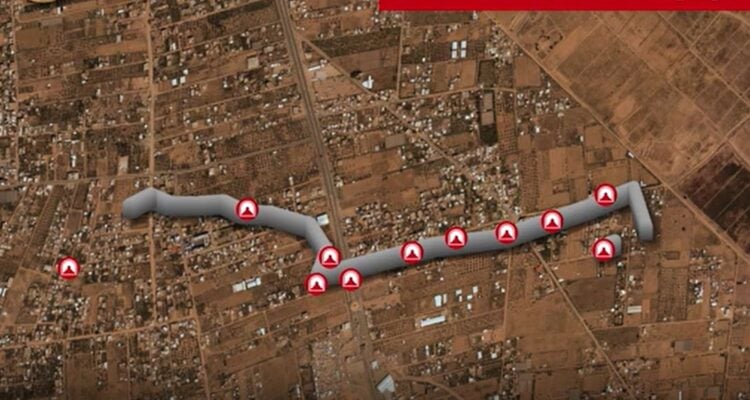Some 20 smuggling tunnels that crossed into Egypt have been found to date, with the IDF already beginning their destruction.
By Batya Jerenberg, World Israel News
The IDF announced Wednesday evening that it has gained full operational control over the crucial strip between Rafah in the Gaza Strip and Egypt known as the Philadelphi Corridor.
Chief Spokesperson Rear Adm. Daniel Hagari called it “Hamas’ oxygen pipeline” due to some 20 tunnels he said the army has found to date that cross the border into the Sinai desert, enabling the “regular” smuggling of weaponry into Gaza.
“We are currently investigating and neutralizing” the tunnels, he said.
In Israeli testimony to the International Court of Justice, the number of tunnels crossing into Egypt was stated as being much higher.
The tunnels’ discovery is embarrassing for Egypt, and its state media was quick to reject the claim.
Al-Qahera News TV cited a “high-level” source who said there is “no truth” to the report, and slammed Jerusalem for “continued Israeli attempts to export lies around the on-ground situation of its forces in Rafah.”
Cairo has said in the past that its forces had destroyed all such underground passages running into its territory.
Hagari said that IDF soldiers had also “found dozens of loaded rocket launchers” along the entire route, as well as launching pits from which Hamas has “fired 70 rockets and mortar bombs in recent weeks” at Israel.
They built this terror structure just “ten to forty meters” from this 11-kilometer section of the border with Egypt, “specifically so that we don’t attack them,” he noted.
Over the last 23 days of fighting in eastern Rafah, Hagari added, Israeli troops found “a huge underground terror infrastructure” used as a base from which to launch attacks at the IDF.
It contained many tunnels that included living quarters and stashes of weaponry such as Kalachnikov automatic rifles, anti-tank missiles, grenades and explosive devices.
One of the shafts, Hagari said, was built just 100 meters from the Rafah crossing.
This crossing is a major entry point for humanitarian aid into the Gaza Strip.
The army blew up the 1.5 kilometer-long network, Hagari stated.
Video of the blast was posted to social media.
The IDF is being careful so far to limit its actions to specific areas in Rafah so as not to raise the ire of the Biden administration, which has repeatedly warned Israel against a massive military operation in Hamas’ last military stronghold in the Gaza Strip.
Hagari made a point of stating that IDF troops are continuing to make raids “on locations about which we have intelligence information.”
The U.S. concern has mostly been focused on the danger to innocent civilians, but the IDF has succeeded in facilitating the evacuation of over a million Gazans to safe zones where they can find food, water, shelter and medical aid.
A prime purpose of the IDF’s actions in Rafah, said Hagari, was to “create the conditions for the return of the 125 hostages,” at least 36 of whom are known to be dead.
A solid majority of Israelis believe that the best way to eke out a hostage deal with Hamas is to apply military pressure on the terrorist organization.





